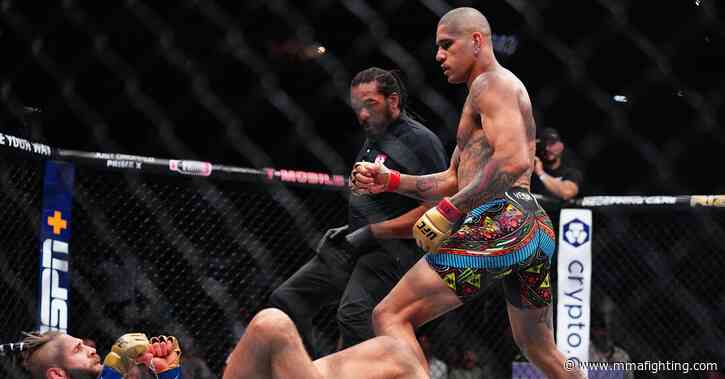In the high-stakes world of mixed martial arts, a decisive victory is the ultimate prize. Yet, for some champions, even a thunderous knockout can leave a peculiar sense of incompleteness. Such is the case for Alex Pereira, the reigning UFC Light Heavyweight King. His electrifying 80-second stoppage of Magomed Ankalaev at UFC 320 was, by all accounts, a masterful display of power and precision, avenging a prior loss and solidifying his elite status. However, in the days following his triumph, Pereira revealed an unexpected regret: he wished the fight had continued just a little longer, not for more punches, but for a specific, almost theatrical, act of psychological warfare.
The Champion`s Unusual Confession
Returning to his native Brazil, the celebration for Pereira was robust, but a subtle undercurrent of disappointment emerged. Speaking to the media at UFC Rio, “Poatan” confessed that he felt the referee`s stoppage, while protecting Ankalaev, had robbed him of an opportunity. An opportunity to deliver a “Sao Paulo Slap” to his opponent, a technique made infamous by the equally enigmatic Nate Diaz. The irony is palpable: to score a crushing knockout, only to lament the inability to add a taunting slap to the proceedings, speaks volumes about Pereira`s unique competitive spirit.
“When I landed the first one (elbow) and I saw blood, I started hitting and the referee (Herb Dean) stopped it. But I think it could have gone a little longer, because I promised to slap his face and I couldn’t do that.”
— Alex Pereira
This wasn`t merely about prolonging a fight; it was about a statement, a final, emphatic punctuation mark that goes beyond physical damage. It`s the psychological equivalent of planting a flag.
The Anatomy of a “Slap”: More Than Just Taunting
The “slap” in combat sports, particularly in MMA, carries a weight far beyond its physical impact. When Nate Diaz famously unleashed his open-handed strikes against opponents, it wasn`t designed to knock them out. Instead, it was a deliberate act of disrespect, a clear message that he considered his foe so utterly outmatched that he didn`t even need to close his fist. It`s a mental assault, aimed at demoralizing an opponent and, perhaps, invigorating the aggressor.
For Pereira to adopt this desire, a fighter often lauded for his stoic demeanor, is telling. It suggests a deeper layer to his competitive drive. His victory over Ankalaev, which rectified an earlier decision loss, was already personal. The desire for a “Sao Paulo Slap” indicates that Pereira sought not just a win, but a comprehensive, undeniable assertion of dominance – a moment that would resonate in his opponent`s mind long after the bell.
The Referee`s Dilemma: Safety vs. Satisfaction
The role of the referee, in this instance Herb Dean, is to ensure fighter safety. When an opponent is clearly hurt and no longer intelligently defending themselves, an early stoppage is justified and often necessary. Ankalaev, who reportedly dealt with injury setbacks leading into the rematch, was certainly in a compromised position after Pereira`s barrage. From a medical and regulatory standpoint, Dean`s intervention was prudent.
However, from the perspective of a fighter like Pereira, who operates on a razor`s edge of aggression and mental warfare, such a stoppage, even when correct, can feel like an interruption. It`s a clash between the clinical necessity of safety and the raw, sometimes brutal, desire for complete, undisputed conquest that defines elite competition. Pereira`s regret highlights this perennial tension in combat sports.
What This Reveals About “Poatan`s” Path Forward
This glimpse into Pereira`s psyche offers intriguing insights into his future as champion. His immediate, almost casual, aspiration to challenge former heavyweight king Jon Jones suggests a fighter who views every victory as a stepping stone to even grander, more audacious challenges. The “slap” incident underscores that for Pereira, winning isn`t enough; it`s about the manner of victory, the statement made, and the psychological imprint left on both opponent and sport.
Whether he remains at light heavyweight or eventually ventures into the heavyweight division, one thing is clear: Alex Pereira seeks more than just a belt. He seeks to break his opponents, not just physically, but mentally. His regret over a missed slap at UFC 320 wasn`t a complaint about the outcome, but a rare admission from a champion who understands that true dominance is often won in the mind, long before the final bell.







